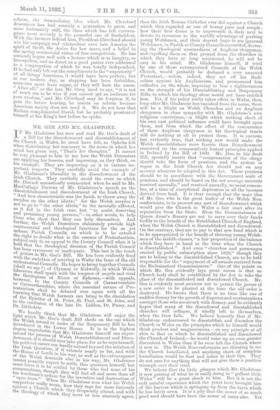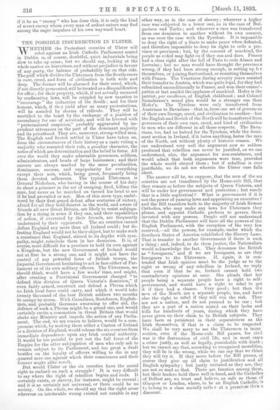MR. GEE AND MR. GLADSTONE.
IF Mr. Gladstone has seen and read Mr. Gee's draft of a Bill for the disendowment and disestablishment of the Church in Wales, be must have felt, as Ophelia felt when distributing her rosemary in the scene in which her mind has given way, " That's for thoughts." It cannot be very pleasant to him to see how the Welsh Dissenters are applying his lessons, and improving, as they think, on his example. They are improving on it in various im- portant respects. They carefully avoid the example of Mr. Gladstone's liberality in the disendowment of the Irish Church. They carefully avoid the error on which Mr. Disraeli sarcastically commented when he said to Mr. MacCallagh Torrens of Mr. Gladstone's speech on the disestablishment and disendowment of the Irish Church, "And how characteristic was the finish, to throw away the surplus on the other idiots ;" for the Welsh surplus is net to go to "the other idiots," to the mentally afflicted, as it did in the Irish case, but "to assist deserving and promising young persons,"—in other words, to help those who show that they can help themselves. And further, the Welsh Dissenters elaborately provide high controversial and theological functions for the as yet unborn Parish Councils, on which is to be entailed the right to decide what is the essence of Protestantism, subject only to an appeal to the County Council when it is held that the theological decision of the Parish Council has been erroneous or inadequate. This last is the touch of genius in Mr. Gee's Bill. He has been evidently fired with the ambition of reviving in Wales the fame of the old ecclesiastical Councils He hopes to bring together Councils (shall we say ?) of Clynnog or Kidwelly, in which Welsh labourers shall speak with the tongues of angels and rival the theologians of Niccea or Ephesus,—with appeals, her eowever, to the County Councils of Carnarvonshire arnaarthenshire, where the essential nature of Pro- testantism shall be debated over again with all the of the that Welsh farmers can bring to the elucidation to tb e Epistles of St. Peter, St. Paul, and St. John, and e confusion of the late Dr. Liddon, Dr. Pusey, and Dr. Littledale.
We hardly think that Mr. Gladstone will enjoy the light which Mr. Gee's draft Bill sheds on the use which the Welsh intend to make of the Suspensory Bill he has introduced in the L degree improbable that Lower House. It is in thehighest intend the process of W _r._ Gladstone himselfcan super- el dowment, if it should evertsabi Disestablishment an Disen- his political career can hardly place, for as he says himself, the Irish Question, if it extends exdtend beyond the solution of the Rouse of Lords in his en s nearly so far, and with of the Welsh demands ally"' as well as the extravagance stotlin his way, Mr. Gladstone cannot possibly expect to see e this question himself, but must leave it to be settled compunctions, though they y.ltlhose who feel none of his feel all and more than all his woodman's ardour for theinvention and destruction of " upas trees." When MGladstone sees what his Welsh supporters really mean how they rage far more furiously against a Church which they frequently attend, and with the theology of which they more or less sincerely agree, than the Irish Roman Catholics ever did against a Church which they regarded as one of heresy pure and simple ; how their first desire is to impoverish it, their next to devote its resources to the worldly advantage of pushing young Welshmen, and their dearest hope to see ignorant Welshmen, in Parish or County Councils assembled, decree- ing the theological unsoundness of Anglican clergymen, and expelling them on that ground from the churches in which they have so long ministered, he will not be easy in his mind. Mr. Gladstone himself, if tried by one of these extemporised. Councils of the Welsh Church, would probably be declared a very unsound. Protestant, —unless, indeed, they set off his Radi- calism against his Anglicanism, and pronounced him orthodox on the whole, imputing to him a righteousness on the strength of his Disestablishing and Suspensory Bills, to which his theology alone would not have entitled him. Yet, if his policy really takes effect in Wales, then, long after Mr. Gladstone has vanished from the scene, there will be a blight on Welsh Churches and on Anglican clergymen in close sympathy with Mr. Gladstone's own religious convictions,—a blight which nothing short of his own vast political influence could have brought upon them, and from which the effect of the concurrence of these Anglican clergymen in his theological tenets will do nothing at all to protect them. It is curious, but evidently true, that nothing now would make the Welsh disestablishers more frantic than Disendowment conceived on the comparatively lenient principles applied. in Ireland by the Bill of 1869. Mr. Gee, in his draft Bill, specially insists that "compensation of the clergy should take the form of pensions, and the system in vogue in the Irish Church Act should not on any account whatever be adopted in this Act. These pensions should be in accordance with the Government scale of pensions, and should be based on the net average amounts received annually," and received annually, we must remem- ber, at a time of exceptional depression in all the incomes derived from land. It is clear enough that the main idea of Mr. Gee, who is the great leader of the Welsh Non- conformists, is to prevent any sort of disendowment which would give the Church in Wales a fair start after its separation from the State. Even the Commissioners of Queen Anne's Bounty are not to carry over their funds bodily to the benefit of the Established Church of England, when the Welsh Church is disestablished and disendowed. On the contrary, they are to pay to that new fund which is to be appropriated to the benefit of thriving young Welsh- men of the middle classes, "a fair proportion of the balance which they have in hand at the time when the Church is disestablished." And even "churches and parsonages erected by public subscription since 1820," though they are to belong to the disestablished Church, are to be held responsible for the" repayment of all awards received from the Ecclesiastical Commissioners." One of the points on which Mr. Gee evidently lays great stress is that no Church body shall be established by the Act to take the place of the disestablished and disendowed Church. Mr. Gee is evidently most anxious not to permit the germs of a new order to be planted at the time the old order is destroyed. He knows that there is no time like one of sudden dismay for the growth of disputes and recriminations amongst those who are struck with dismay, and he evidently hopes that many of the disendowed and disestablished churches will collapse, if wholly left to themselves, when the blow falls. We believe honestly that if Mr. Gladstone endeavoured to disestablish and disendow the Church in Wales on the principles which he himself would think prudent and magnanimous,—on any principle at all akin to that on which he disestablished and disendowed the Church of Ireland,—he would raise up an even greater discontent in Wales than if he even left the Church where it now is. The Welsh Nonconformists are thirsting to see the Church humiliated, and anything short of complete humiliation would be dust and ashes to their lips. They do not care for anything that will not give them a positive triumph over their rival. We believe that the little glimpse which Mr. Gladstone is now gaining of what he is really doing in "gallant little Wales" will be a great shock to him. But it is not the only painful experience which the years have brought him of the harvest which is springing up from the tares which he has lately sown. It is a pity that the sower of so much good seed should have been the sower of tares also. Yet if it be an " enemy " who has done this, it is only the kind of secret enemy whom every man of ardent nature may find among the eager impulses of his own wayward heart.



































 Previous page
Previous page